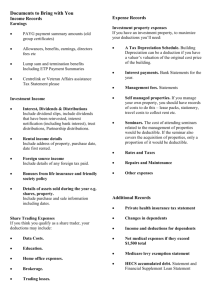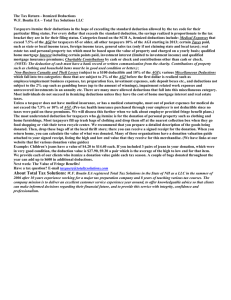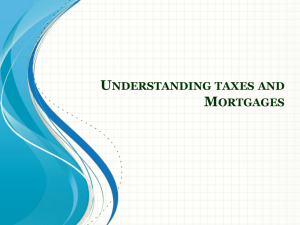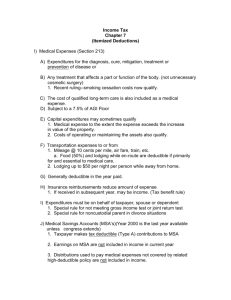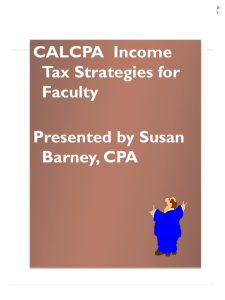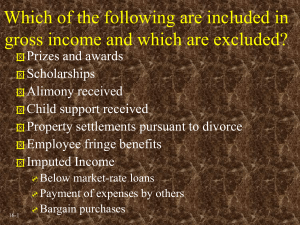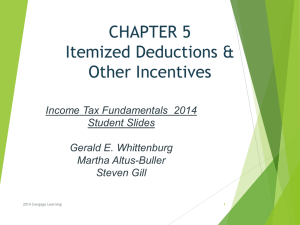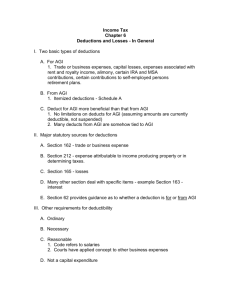Chapter 5
advertisement
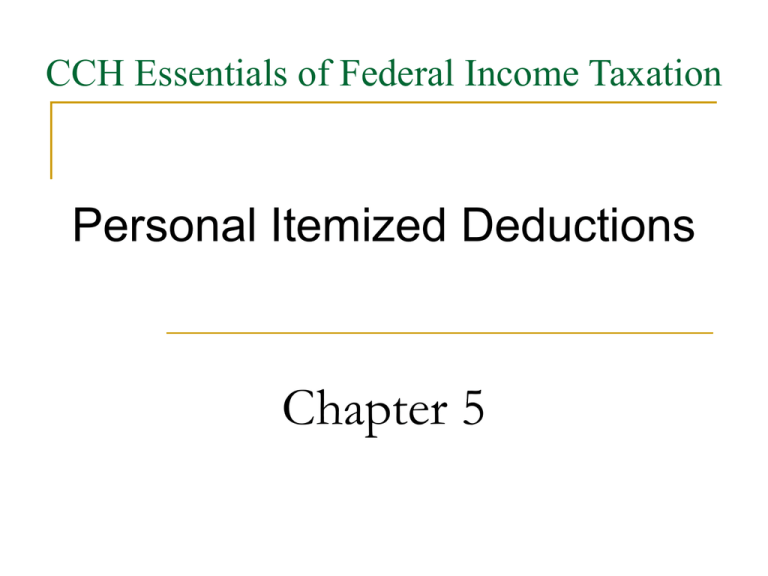
CCH Essentials of Federal Income Taxation Personal Itemized Deductions Chapter 5 Wisconsin Income Tax Overview http://www.revenue.wi.gov/html/taxind.html 2 When to Itemize? Itemized Deductions > Standard Deduction Single $5,350 Married/Joint $10,700 Married/Separately $5,350 Each partner must itemize or claim Standard Head of Household $7,850 Usually applies to homeowners 3 Itemized Deductions Reported on Schedule A Examine Schedule A—p. 5.4 Medical and Dental Expenses (line 4) Taxes You Paid (line 9) Interest You Paid (line 15) Gifts to Charity (line 19) Casualty and Theft Losses (line 20) Job Expenses and Most Miscellaneous Deductions (line 27) Other Miscellaneous Deductions (line 28) Total Itemized Deductions (line 29) Chapter 5 4 Three Groups of Medical Expenses Prescription drugs and insulin All medical and dental insurance premiums paid by the taxpayer Other medical expenses Chapter 5 5 Prescription Drugs and Insulin Only medications and accessories purchased on the basis of written prescriptions generate deductible medical expenses. Even when prescribed, the purchase of over-the-counter medications and vitamins does not qualify. When prescribed for certain conditions, some items (e.g., distilled water, special foods) are only deductible when they cost more than regular foods of the same types. Even then, only the additional cost becomes a deduction. Chapter 5 6 Medical and Dental Insurance Premiums Medical expenses include the full amounts of insurance premiums covering medical and dental care. Self-employed taxpayers can use 100% of the family’s total insurance premiums to reduce gross income before AGI. Taxpayers may not use this premium cost for any month the taxpayer or spouse has eligibility under an employer’s medical plan. Medicare premiums and long-term care insurance premiums are included Life insurance, auto medical payments, and premiums paid through cafeteria plans are excluded Chapter 5 7 Other Medical Expenses General items—normal expenses Special medical expenses Nursing home care School for the handicapped Employee physicals (not employer required Transportation expenses--.20 per mile Travel expenses--$50 per night lodging Capital expenditures—prescribed home improvements Other—eyeglasses, hearing aids, Chapter 5 dentures,wheelchairs 8 MEDICAL REIMBURSEMENTS RARE--If an employer paid insurance plan provides reimbursement for more than the actual medical cost, the excess is taxable SOMETIMES—a taxpayer takes a deduction for medical in one tax year, but receives a reimbursement payment from insurance in the following tax year Reimbursement is taxable income only to the effect of the tax-benefit rule 9 MEDICAL DEDUCTIBILITY AMOUNT 7.5% of AGI rule ONLY the amount of medical costs which are over 7.5% of AGI are deductible Most taxpayers with health insurance coverage will not have sufficient medical costs to itemize Problems 1--5 10 Deductible Taxes Income Taxes (State, Local, or Foreign) State and local income taxes from W-2 Estimated tax deposits paid Taxes paid for previous years Foreign income taxes (if not used as a tax credit) Employee contributions to a state unemployment fund OR General Sales Tax see Pub. 600 for individual states Chapter 5 11 Deductible Taxes--Real estate taxes Ad Valorem tax—on property value State and local real estate taxes Foreign real estate taxes Tenant’s share of real estate taxes paid by a cooperative housing corporation Real estate taxes on condominium units Apportioned amount at Sale Personal property taxes State and local personal property taxes Usually tangible property which is taxed according to its value May include boats, airplanes, trucks, trailers, RVs, mobile homes, cars in some states Chapter 5 12 Nondeductible Taxes Federal income taxes Social security and Medicare taxes Federal or state, estate, gift, or inheritance taxes State and local license fees (driver’s, marriage, fishing) Sales, use, and excise taxes (gasoline, cigarette, alcohol) Qualified taxes paid on behalf of other taxpayers Fines; Penalties and interest included in tax bills Chapter 5 13 Interest Paid Interest on qualified personal residence Acquisition indebtedness Home equity indebtedness Points Some mortgage insurance premiums Investment interest expense Chapter 5 14 Interest on a Qualified Personal Residence Taxpayer’s main home Plus one secondary residence Vacation home, home in another city, condominium Interest must have been actually paid by taxpayer 15 Acquisition Indebtedness Interest Home mortgage interest Interest on money borrowed to buy, build, or extensively remodel the residence Applies to Principal or secondary home Debt limited to $1 million Or $500,000 (MFS) 16 Home Equity Interest Sometimes referred to as Second Mortgage Interest which is secured by taxpayer’s home Total loan debt (acquisition + home equity) cannot exceed FMV of the home Debt limited to $100,000 No restrictions on use of the loan money Form 1098 reports interest paid to a lender 17 Points & Mortgage Insurance premiums Points are interest charges paid up-front, usually as part of the cost of financing Deduct on line 10 if they are reported on 1098 Deduct on line 12 if not reported—may be amortized amounts from previous years Mortgage Insurance premiums for homes purchased in 2007 which are subject to mortgage insurance AGI phaseouts begin at $100,000 or $50,000 18 Investment Interest Expense Interest PAID to buy or keep investments Limited to Margin Accounts, stocks, bonds, vacant land, partnerships, artwork, gems Other investments are covered under “passive investments” or rental properties Expense limited to net investment income (excess of income over expense) Additional amount may be carried over 19 Gifts to Charity Must be a recognized charity, religious organization, government, educational, scientific or qualified institution (per IRS) Contributions by cash or check or property $250 or more single donation must have written receipt Must exclude anything of value received as part of the gift or contribution Pledges are not deductible until paid Chapter 5 20 Noncash Contributions Auto expenses deductible at .14 per mile Property usually at FMV Tangible Personal Property such as clothing, furniture, etc. at FMV, with a statement of value from the organization Intangible Property such as stocks and bonds at FMV. Also called Qualified Gain Property. Must be held more than 1 year. Ordinary income property at cost basis 21 Nondeductible Contributions Political parties or political action groups Private individuals Clubs and lodges and social organizations Tuitions at private schools Raffle tickets Foreign organizations The value of your time or services Total limitation of 50% of AGI (or 30%--20%) 22 Casualty and Theft Losses Casualty events—sudden, unexpected, or unusual event Reduce deductible loss by $100 per event And 10% of AGI Must provide proof of casualty and FMV Only for damages to taxpayer’s property Usually deducted in the year of casualty Chapter 5 23 DEDUCTIONS LIMITATION High income taxpayers may have their deductions limited If AGI is in excess of $150,500 (75,250 mfs) the taxpayer may lose 2% of excess AGI Includes Taxes, mortgage interest and points, charitable contributions, misc deductions Not limited deductions are medical, investment interest, casualty-theft losses, gambling losses 24
